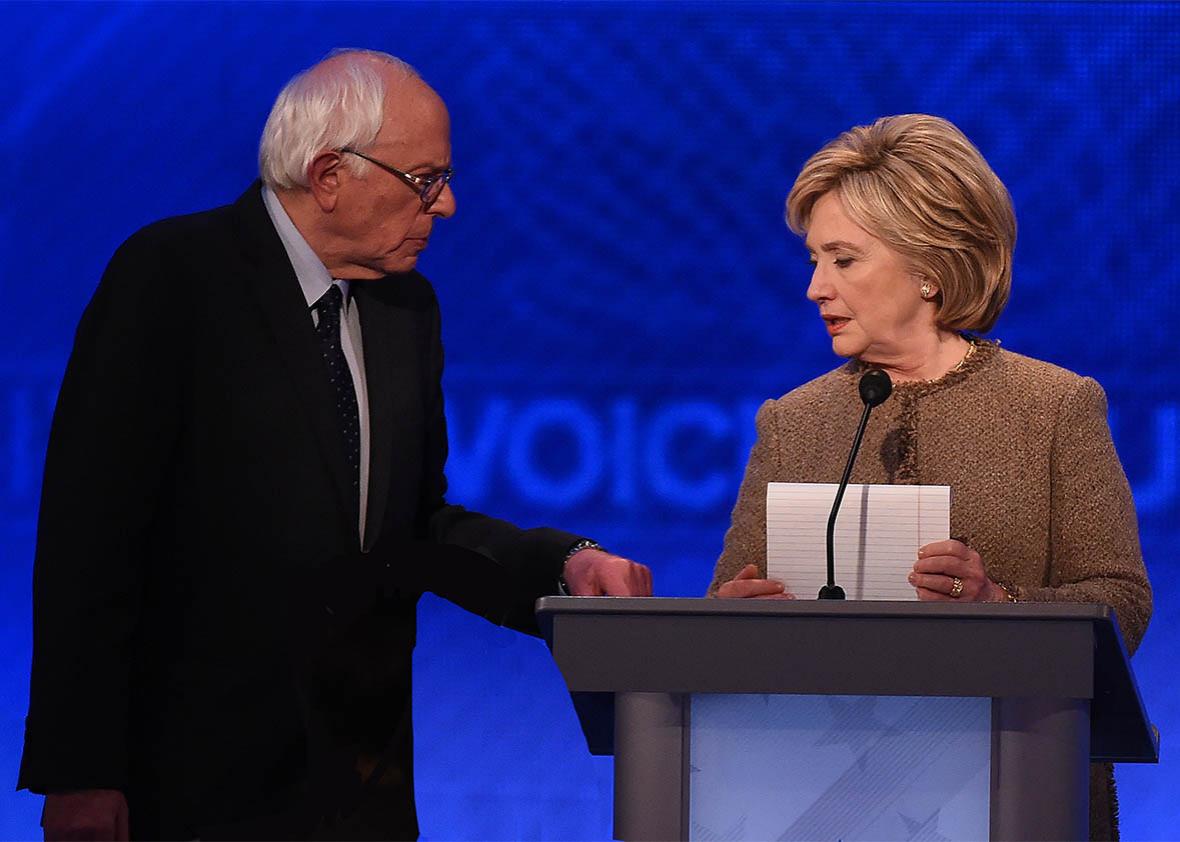On Sunday, the Democratic horse race got a little tighter, and a little more tense.
According to the latest survey from Marist, NBC News, and the Wall Street Journal, Hillary Clinton leads Bernie Sanders in Iowa. But this isn’t news. What’s news is that her lead has dropped to just three points over the Vermont senator. In fairness, this is one poll, and in the average of all Iowa surveys, Clinton still leads by more than 10 points. But the median result of the past five polls is a Clinton lead of 9 percentage points, in line with the average and evidence of a tightening race. And this is on top of her large deficit in New Hampshire, where Sanders leads by 4 in the latest poll and just under 5 points in the average.
Clinton says she isn’t worried. “[Y]ou know these polls go up, they go down,” she said on Sunday in an interview with CBS News’ Face the Nation. “I stay pretty focused, as I think we all should, on what we have to do to build on the progress of the Obama administration, but go even further.” But her next sentence, an implicit jab at Sanders’ position on guns, belied that confidence. “And that’s why I have outlined a very significant agenda to raise wages and to take on the gun lobby and to be making America safe in every way that I can.”
On that score, Clinton has a new ad touting her electability. “They’re backwards, even dangerous,” warns a narrator over footage of the GOP presidential field, from Sen. Ted Cruz promising to “carpet bomb” ISIS “into oblivion” to Chris Christie telling a man to “sit down and shut up.” “Who’s the one candidate who can stop them?” asks the voice-over, prompting a clip from Clinton’s testimony to the House committee on the Benghazi attacks. “Tested, and tough,” says the narrator. “To stop them, stand with her.”
It’s a strong advertisement. But again, it shows the extent to which the Clinton camp is nervous about Sanders’ rise and durability, even as they voice total confidence.
And as if to highlight this narrow race, White House Chief of Staff Denis McDonough relayed a message from the president while speaking on NBC’s Meet the Press. “When can we expect [President Obama] to make his choice public on who he supports in the Democratic primary?” asked host Chuck Todd. “Well, we’ll do exactly what has been done in the past,” said McDonough, ruling out an endorsement from the president.
McDonough has his history wrong. In the 2000 primary, President Bill Clinton endorsed Al Gore against Sen. Bill Bradley, who—like Sanders—ran a liberal campaign against the party establishment. With that said, there aren’t enough examples—sitting Democratic president endorsing a candidate in the party primaries—to say there’s a tradition here. It’s neither normal nor unusual for Obama to demur. Still, the nature of the thing makes it noteworthy.
You can read Obama’s decision as a bad omen for Clinton—a vote of no confidence in his old rival. Or, if you adjust your focus from that of Obama’s relationship with Clinton to his place as Democratic Party leader, you can see this as the best possible decision for the presidential primary.
If there’s a danger in the contest between Clinton and Sanders, it’s the belief—arguably justified, given the fracases over debate scheduling and voter contact files—that the Democratic National Committee has placed its thumb on the scale for Clinton. An Obama endorsement for Clinton—his first Secretary of State—would make this even worse, fueling anger among some segment of Sanders’ supporters. Which, if Clinton won the nomination, would make reconciliation more difficult. And on the other end, an Obama endorsement for Sanders could rekindle the tensions of the 2008 primary, especially among Clinton’s strongest and most dedicated supporters.
By staying out of primary politics, Obama sidesteps all of this, and he gives an invaluable boost to Clinton should she win. If in June Clinton is the nominee after a tough fight against Sanders, she’ll be a stronger candidate with greater legitimacy within the Democratic Party.
Indeed, you could almost make the case that since she’s favored to win—given her strong position with black and Latino voters, as well as more moderate Democrats—a New Hampshire and Iowa loss might be good for her campaign. It would turn this primary into a fierce contest that could prep the party for an even fiercer general election. And, for the liberal and left-wing activists who back Sanders, it deepens their experience and strengthens their position in the party long-term.
Jesse Jackson ran two campaigns for the Democratic nomination, once in 1984 and again in 1988. No, he didn’t win. But he presaged the present-day Democratic coalition—of minorities, young people, and educated liberal whites—and paved a future for black politicians with presidential ambitions. What’s more, his campaign was a darkroom for a whole generation of Democratic operatives, who would work in other campaigns and seed the lessons of Jackson’s effort throughout the Democratic Party.
A long, hard-fought campaign could do the same for left-wing liberalism. If Team Sanders sticks to Democratic politics, win or lose, then 20 years from now, America might be looking at its first (democratic) socialist president.
